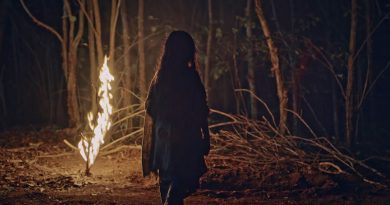Nota (2015) Review
Before the release of Nota on August 13th, I had little knowledge about this movie. It was not until I discovered a series of overwhelming responses that finally piqued my interest to check out the movie in the cinema. There were only four audiences (including me and my friend) for the Nota showing — a shockingly low attendance if you ask me.
But after watching the movie, it’s easy to see why. Despite familiar faces (Hans Isaac and Maya Karin) and a psychological thriller-drama element, Nota is hardly the kind of movie that would easily attract mainstream audiences. Still, that doesn’t bother me at all because Nota is a rare local gem worth checking out, especially for those who often complain about the lack of quality movies in Malaysia.
The story follows Kamal (Hans Isaac) and Erin (Maya Karin), who used to be a happily married couple. But those blissful days are long gone after years of failure to conceive a child. Since then, they hardly communicate with each other. On their 10th wedding anniversary, they decided to spend their time together at the Bako National Park in Sarawak. It was also the same place that Kamal had proposed to her. Then Erin discovers a note by accident, which concerns Kamal’s plan to end his marriage with her.
As far as I recall, this was the first time I saw a local movie that made great use of outdoor scenery in Sarawak. Shot on location around Kuching and Bako National Park, director Yasu Tanaka and his cinematographer Maximilian Schmige have successfully captured the majestic beauty of the Sarawak landscapes. From a bird’s-eye view of the rainforest to the panoramic shot of the sea stack and the wide open sea around Bako National Park, Nota is a cinematic triumph that has to be witnessed on the big screen.

Then there’s Tanaka’s fascinating direction that favours more surrealistic imagery (such as the one where Erin penetrates her finger through the aquarium glass), and expressive visuals of everyday objects (the close-up shot of boiling rice inside the rice cooker quickly springs to mind). It was a bold approach that mostly eschews the traditional in-your-face narrative structure, and made way for ambiguous visual perspectives to tell the story through the confused mind of Erin’s point-of-view.
The small-scale cast is equally praiseworthy. Hans Isaac and Maya Karin (who are real-life friends, but acted together for the first time) are both convincing as an unhappily married couple on the verge of total collapse. Despite their challenging roles that only have minimal dialogues, Isaac and Karin manage to prove their worth in conveying their emotions through a subtle mix of facial expressions and body language. But the late veteran actor Ramli Hassan (1999’s Anna and the King, 2006’s The Red Kebaya) steals the limelight with his eccentric performance as Jemat the local boatman.
If there’s any flaw in Nota, I would say some of Tanaka’s directions are rather questionable. The scene where Erin imagined killing her husband with a branch while trekking deep into the forest, looks awkward. It reminds me of a scene that usually served better on a comedy or an over-the-top thriller, but hardly fits well for such a visually-ambiguous movie like Nota. There’s another scene that feels totally out of place, where a wooden-looking chalet receptionist suddenly flashes his smile as he welcomes both Kamal and Erin.
Still, it’s not every day we get to discover a locally-made movie with a unique visual pedigree like Nota. Despite some of the movie’s shortcomings, Tanaka remains an interesting filmmaker to watch for. I’m looking forward to seeing more of his feature-length effort in the future.





